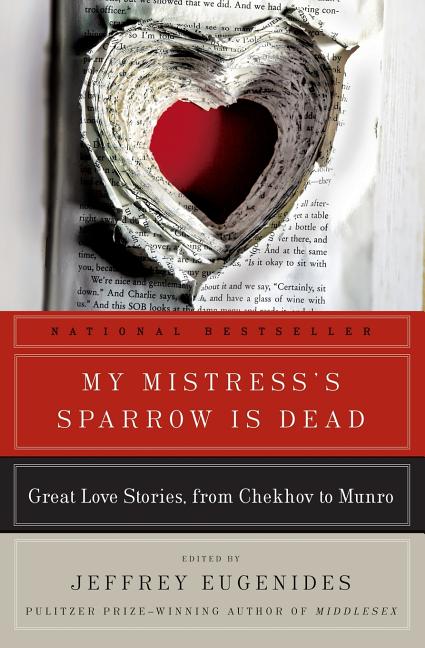Jeffrey Eugenides was born in Detroit, Michigan, in 1960. He graduated magna cum laude from Brown University, and received an MA in English and Creative Writing from Stanford University in 1986. His first novel, The Virgin Suicides, was published to acclaim in 1993. It has been translated into 34 languages and made into a feature film. His fiction has appeared in The New Yorker, The Paris Review, The Yale Review, Best American Short Stories, The Gettysburg Review, and Granta’s “Best of Young American Novelists.” Eugenides is the recipient of many awards, including fellowships from the Guggenheim Foundation and the National Endowment for the Arts and the Henry D. Vursell Memorial Award from the American Academy of Arts and Letters. In the past few years he has been a Fellow of the Berliner Künstlerprogramm of the DAAD and of the American Academy in Berlin. After several years in Berlin and Chicago, Eugenides now lives in Princeton, New Jersey with his wife and daughter, where he is Professor of Creative Writing in the Peter B. Lewis Center for the Arts at Princeton. In 2003, Jeffrey Eugenides received The Pulitzer Prize, the WELT-Literaturpreis of Germany, and the Great Lakes Book Award for his novel Middlesex (2002). Middlesex was also shortlisted for the National Book Critics Circle Award, France’s Prix Medici, and the International IMPAC Dublin Literary Award. His latest novel, The Marriage Plot, was published in 2011.

-
The Virgin SuicidesA Novel
On the morning the last Lisbon daughter took her turn at suicide—it was Mary this time, and sleeping pills, like Therese—the two paramedics arrived at the house knowing exactly where the knife drawer was, and the gas oven, and the beam in the basement from which it was possible to tie a rope. They got out of the EMS truck, as usual moving much too slowly in our opinion, and the fat one said under his breath, “This ain’t TV, folks, this is how fast we go.” He was carrying the heavy respirator and cardiac unit past the bushes that had grown monstrous and over the erupting lawn, tame and immaculate thirteen months earlier when the trouble began.
 The Virgin Suicides : A Novel
The Virgin Suicides : A Novel -
The Virgin SuicidesA Novel
The year of the suicides the Lisbons’ leaves went unraked. On the appropriate Saturday Mr. Lisbon didn’t stir from his house. From time to time as we raked, we looked over at the Lisbon house, its walls accumulating autumn’s dampness, its littered and varicolored lawn hemmed in by lawns becoming increasingly exposed and green. The more leaves we swept away, the more seemed heaped over the Lisbons’ yard, smothering bushes and covering the first porch step. When we lit bonfires that night, every house leaped forward, blazing orange. Only the Lisbon house remained dark, a tunnel, an emptiness, past our smoke and flames. As weeks passed, their leaves remained. When they blew onto other people’s lawns there was grumbling. “These aren’t my leaves,” Mr. Amberson said, stuffing them into a can. It rained twice and the leaves grew soggy and brown, making the Lisbon lawn look like a field of mud.
 The Virgin Suicides : A Novel
The Virgin Suicides : A Novel -
The Virgin SuicidesA Novel
…about the time the first cold spell hit, people began to see Lux copulating on the roof with faceless boys and men.
At first it was impossible to tell what was happening. A cellophane body swept its arms back and forth against the slate tiles like a child drawing an angel in the snow. Then another darker body could be discerned, sometimes in a fast-food restaurant uniform, sometimes wearing an assortment of gold chains, once in the drab gray suit of an accountant. Through the bronchioles of leafless elm branches, from the Pitzenbergers’ attic, we finally made out Lux’s face as she sat wrapped in a Hudson’s Bay blanket, smoking a cigarette, impossibly close in the circle of our binoculars because she moved her lips only inches away but without sound.
 The Virgin Suicides : A Novel
The Virgin Suicides : A Novel
"A towering achievement . . . [Eugenides] has emerged as the great American writer that many of us suspected him of being." —Los Angeles Times Book Review [on Middlesex]
"An epic . . . This feast of a novel is thrilling in the scope of its imagination and surprising in its tenderness." —People [on Middlesex]
"Unprecedented, astounding . . . The most reliably American story there is: A son of immigrants finally finds love after growing up feeling like a freak." —The San Francisco Chronicle Book Review [on Middlesex]
"Mr. Eugenides is blessed with the storyteller's most magical gift, the ability to transform the mundane into the extraordinary." —The New York Times Book Review [on The Virgin Suicides]
"Arresting . . . uncannily evokes the wry voice of adolescence and a mixture of curiosity, lust, tenderness, morbidity, cynicism, and the naïveté surrounding these bizarre events." —The Wall Street Journal [on The Virgin Suicides]
Selected Works
- Print Books
- Find your local bookstore (via IndieBound)
- Powell's
- Barnes & Noble
- E-Books
- Kobo
- Google Books
- Barnes & Noble

- Print Books
- Powell's
- Barnes & Noble
- Alibris
- Abe Books
- E-Books
- Kobo
- Barnes & Noble

- Print Books
- Powell's
- Barnes & Noble
- Alibris
- Abe Books
- E-Books
- Kobo
- Barnes & Noble

- Print Books
- Powell's
- Barnes & Noble
- Alibris
- Abe Books
- E-Books
- Kobo
- Google Books
- Barnes & Noble